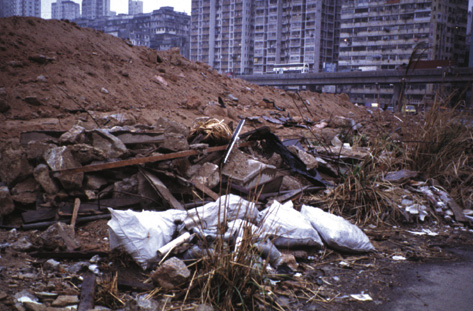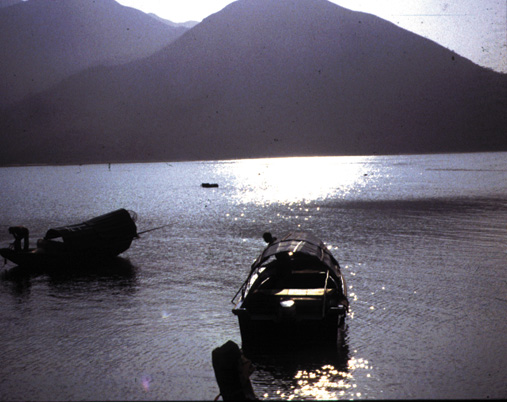 Thorns of roses
Thorns of rosesThe airport project is mixed blessing for local residents



 Thorns of roses
Thorns of roses
The airport project is mixed blessing for local residents
By Pearl Lee
 Above: Rubbish dumps created by the "rose garden".
Above: Rubbish dumps created by the "rose garden".W hile it is claimed that eve- ryone here is going for the “Rose Garden”, some people, whose pain has been caused by the thorns during its construction, seem to have been simply deleted from the rosy picture.
The development of a new airport and the related core projects, symbols of the “stability and prosperity” of Hong Kong, are affecting the residents of Lantau Island, Western Kowloon and the northeast part of the Hong Kong Island.
The Green Lantau Association, founded in 1989, has been monitoring the airport project in northern Lantau for five years. Although the group claims the government ignores their protests, core project administrators disagree.
In January 1996, the Green Lantau Association expressed its discontent with the government’s ignorance of the environment to officials.
“But,” said Mr. Pang Yiu Kai, the spokesperson of the Green Lantau Association, “the government did not consider our complaints seriously.”
He said that this was not the first time that they had approached the government.
Since 1991, they have sent several complaints — including complaints of land pollution, deforestation and rubbish dumping — to the government, which, in return, showed little concern.
For instance, when they complained about illegal dumping at Wong Lung Hang Valley, the government did not consider their complaints seriously.
Therefore, they are now shifting to exert pressure through the Commission for Administrative Complaints to urge the government to take action.
 Mr. Pang said, “It should be the government’s social responsibility to put environmental conservation before businessmen’s economic interests in order to prevent further destruction of the natural environment.
Mr. Pang said, “It should be the government’s social responsibility to put environmental conservation before businessmen’s economic interests in order to prevent further destruction of the natural environment.
“Every piece of new legislation for environmental conservation should be accompanied by provisions for inspection to ensure proper operation.”
On the other hand, the New Airport Projects Coordination Office denied that the government ignores environmental issues.
Mr. Angus Mo Kon Shing, the coordinator, said the government had established an inspection system on Lantau Island.
 Above: Fishermen's livelihoods are affected by the airport project.
Above: Fishermen's livelihoods are affected by the airport project.
“The government employs sophisticated companies which use sophisticated equipment to measure the quality of air and water, and the level of noise,” he said.
“We do care about the complaints of the green groups and have tried to meet their demands.
“For instance, we have reforested, according to their guidelines, an area which was once illegally cleared to put the materials for construction of a microwave relay station on a hilltop.”
However, the situation is also poor in the surrounding sea, according to Mr. Pang. “Fishermen of Cheung Chau have complained about some dumping ships which deposited mud before reaching the South Cheung Chau dumping site in order to save time and fuel,” said he.
To date, 184 million cubic metres of mud removed from the airport site and “borrow pits”, or excavations, have been dumped at sea.
Moreover, 53 million cubic metres of sand have been dredged from borrow pits on the sea bed for the airport.
The quality of water at the north end of the airport site, south of Cheung Chau, around Tathong Channel and Tai Sui A Chau, is hence affected.
These areas are all working sites of local fishermen.
Mr. Cheung Chee Chuen, chairman of the Hong Kong Kowloon Fishermen’s Association, said, “Reclamation, dredging and dumping pollute the water and therefore cause great loss to us.
“Some members have quit the profession, while others are still hanging on with the small amount of fish here.
“It is difficult for fishermen to change their occupation because of their low educational level,” he added.
Since 1992, the Agricultural and Fisheries Department has been giving ex-gratia payments to affected fishermen.
According to Mr. Joseph Sham Chun Hung, the senior Capture Fisheries officer, the affected fishermen were registered after the announcement of each plan of the project.
The ex-gratia payments are calculated according to the fishing area, total value of their catch within three years, and the lengths of the ships they own.
Mr. Cheung said that the method of calculation was unfair to those who owned ships over 15 metres long.
“Initially,” he said, “they received no ex-gratia payments because the Agricultural and Fisheries Department regarded these ships as those fishing outside Hong Kong waters.
“However, it is the poor water quality caused by the new airport project which forces them to fish there. Therefore they are also in the affected group.
“Although they eventually will be compensated after hard struggles, like going onto the streets in protest, the small amount of money is hardly enough to support them in the long run.”
In fact, not only the countryside residents, but residents of urban areas are also victims to the “rose garden” projects.
For example, residents in Western Kowloon experience the disturbances brought by the projects every day.
Mr. Wong Kok Kei, a District Board member from Tai Kok Tsui, said, “Increasing suspension of dust in the air, noise from construction sites, traffic jams, and accumulations of litter are the problems faced by the residents.”
He said that after the reclamation work started in 1992, residents in Yau Ma Tei, Tsim Sha Tsui and Mong Kok predicted some of the undesirable consequences.
When the contractors do not work according to the rules — working late into the evening, or starting construction early in the morning, for example — disturbances exceed even their expectations.
A recent survey of the Association for Democracy and People’s Livelihood shows that working overnight and unreasonable delays of construction projects are great annoyances to both residents and shop owners.
According to Mr. Wong, when a construction project is delayed, undesirable consequences are passed along to the following projects.
He said, “We have made complaints to the government, but little can be done.
“The government seems to have sympathy towards the contractors when construction projects have to be delayed.
“The amount of the penalties is not great enough to stop the contractors.”
Mr. Mo, however, claimed that with the introduction of new environmental laws, $5,000 for the first charge is enough of a deterrent.
Despite deterrents, he admitted that some contractors work outside the specified time range of 7 a.m. to 7 p.m. in order to finish jobs on time.
Mr. Wong said he has raised these problems in the meetings.
He urged the government to set up regular inspection systems and improve cooperation among departments.
To Mr. Pang, what he is mostly concern about is summed up this way: “If people continue to develop the economy at the expense of the natural environment, our whole natural web of life will be destroyed.”

